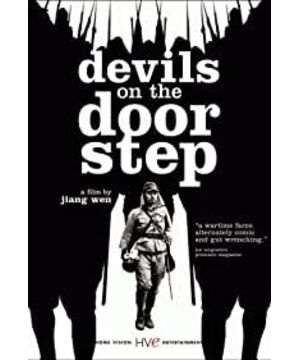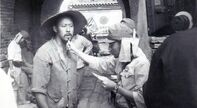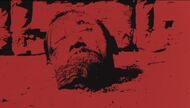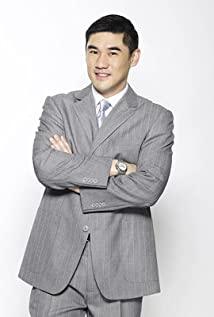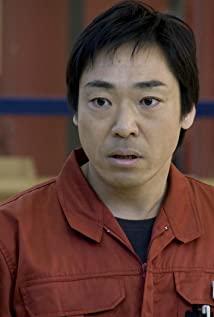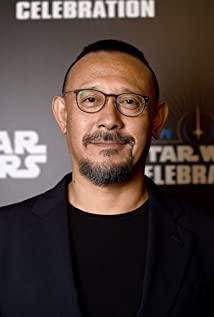I believe that Jiang Wen is a patriotic person from the bottom of his heart. He is a peaceful and simple village. Neighbors love each other, just like a family. Every evening and sunset, a team of spirited troops will pass by. The children along the road, the villagers, and the soldiers shouted "Sensai" one by one. They also smiled and walked away. They praised me for being sensible. Even if I occasionally criticized the villagers, it was because the villagers did not meet the gentlemen in time. The habit of being punctual. At this time, an "I" suddenly came and broke this calm. The two people they sent turned the village upside down and turned the atmosphere in the village into tension and panic. Neighbors shirk their responsibilities, forcing an innocent and honest person to kill at dusk The army passing by was ferocious. They beat gongs and drums like the cry of hell, which alarmed the two evil spirits sent in the cellar. They not only gave the children candy, but also stabbed the children to death without blinking the villagers. If you don't call "Sensai", you will be beaten, or even killed. Even if you are flattering like a dog, you will be beaten and kicked. After he arrived, the world has completely changed for us. When did it start to be so distorted? As long as anti-Japanese-themed movies don’t show criticism of a certain political party, wouldn’t it be profound? In other words, seeing the evil of this political party is a ticket to the circle of "understanding people". If you don't criticize its evil, then your understanding will not be deep enough, and you will be servile. Are we touting Jiang Wen because he is a pioneer in this area? So you are sorely mistaken. Has the world changed after "I" sent two people? No, it shows us the world as it is. It turns out that the villagers are not only kind and innocent, but they will also stand by and watch Ma Dasan's tragic experience, while talking about his sarcastic words, while using various reasons to prevaricate others, they will even provoke others to do things that they feel terrifying. Although I feel guilty, I still can't accept the murder that I single-handedly facilitated. It's as if I didn't participate in it if I didn't fill in the soil. I can isolate the "killer demon" with peace of mind. You can understand that you can't cover up all the evil with the ignorance of the villagers. This is the most real human nature. There are bad roots and good roots. It turns out that Japanese people who kill without blinking an eye also have credit, and they value it very much. Jiang Wen once said in an interview: In 1982, when I was studying in Zhongxi Opera, a group of Japanese students came to the class. They were the same age as us, and they had a very good relationship. . At the time, I was very surprised. They all said the same thing as the Japanese devils like Matsui in the anti-Japanese movie I watched when I was a child. How could their attitudes and people's mental outlook be so different from Matsui and the others? They are a generation apart from Matsui and the others, but the images of the two never overlap. Since then, I have listened to a lot of people who have experienced the Anti-Japanese War with this question in mind. Later, when I had the opportunity to go to Japan, I also read a lot, listened to a lot, and watched a lot of anthropology such as "The Chrysanthemum and the Knife". , Sociological works... Now, I can gradually overlap the images of these two types of Japanese people. They are actually the same thing, but they are expressed in different forms in different environments. This creeps me out: a mild-mannered Japanese can easily become the Japanese soldier we remember. Jiang Wen once said in an interview: In 1982, when I was studying in Zhongxi Opera, a group of Japanese students came to the class. They were the same age as us, and they had a very good relationship. . At the time, I was very surprised. They all said the same thing as the Japanese devils like Matsui in the anti-Japanese movie I watched when I was a child. How could their attitudes and people's mental outlook be so different from Matsui and the others? They are a generation apart from Matsui and the others, but the images of the two never overlap. Since then, I have listened to a lot of people who have experienced the Anti-Japanese War with this question in mind. Later, when I had the opportunity to go to Japan, I also read a lot, listened to a lot, and watched a lot of anthropology such as "The Chrysanthemum and the Knife". , Sociological works... Now, I can gradually overlap the images of these two types of Japanese people. They are actually the same thing, but they are expressed in different forms in different environments. This creeps me out: a mild-mannered Japanese can easily become the Japanese soldier we remember. Jiang Wen once said in an interview: In 1982, when I was studying in Zhongxi Opera, a group of Japanese students came to the class. They were the same age as us, and they had a very good relationship. . At the time, I was very surprised. They all said the same thing as the Japanese devils like Matsui in the anti-Japanese movie I watched when I was a child. How could their attitudes and people's mental outlook be so different from Matsui and the others? They are a generation apart from Matsui and the others, but the images of the two never overlap. Since then, I have listened to a lot of people who have experienced the Anti-Japanese War with this question in mind. Later, when I had the opportunity to go to Japan, I also read a lot, listened to a lot, and watched a lot of anthropology such as "The Chrysanthemum and the Knife". , Sociological works... Now, I can gradually overlap the images of these two types of Japanese people. They are actually the same thing, but they are expressed in different forms in different environments. This creeps me out: a mild-mannered Japanese can easily become the Japanese soldier we remember.
I think Jiang Wen has a deep understanding of Japan's national culture. Japanese people are very paranoid at one point. This kind of paranoia has made Frankenstein like a day for decades, and it has also made Lushun a murderer. In the film, the officer's parents said to him: "Because of the sacrifice of the hero of the flower house, I can't even lift my head up in front of the flower house family. You have to kill more ZhiNa pigs to win glory for the country", some things, they will feel honor rather than shame , Understanding this, we may be able to understand Japan's current attitude towards the Nanjing Massacre and comfort women. If you ask why after turning your head nine times, you can still blink three times and smile at the corners of your mouth, you are sincerely thanking Huawu Xiaosanlang, who made us understand what kind of nation this is. What I want to say is that although the arrival of "I" has brought disaster to the whole village, it has broken the false peace and continued enslavement.
This is the bloodiest ode to a political party. Although bloody, it is a carol.
View more about Devils on the Doorstep reviews


